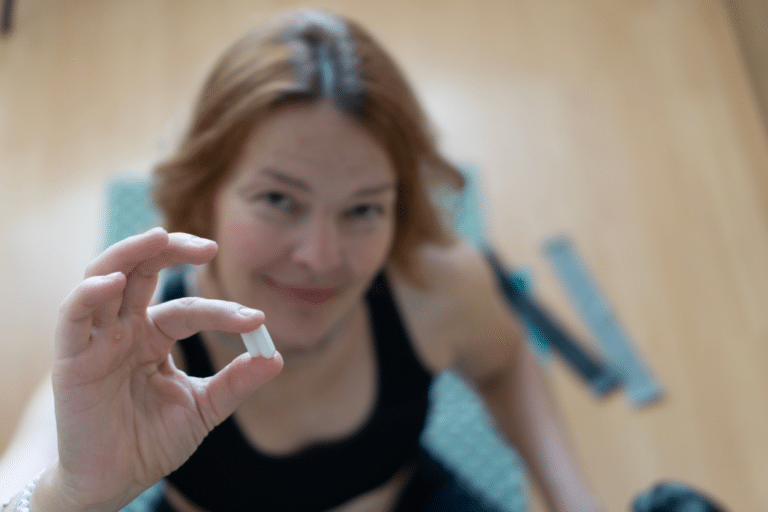Chronic insomnia is one of the most debilitating symptoms of perimenopause for a lot of women (myself included).
There’s nothing worse (IMHO) than lying awake staring at the clock while your hormones are having a PAR-TAY! What’s a girl to do???
Lack of sleep makes you cranky…that’s bad enough. But long-term insomnia can lead to other problems obesity, diabetes, hyper-tension, heart disease, depression, and impaired immune function.
Why do so many women suffer with insomnia in perimenopause?
Low levels of progesterone (the most common imbalance in perimenopause) contribute to sleep problems. Progesterone is calming and in perimenopause lack of ovulation leads to dramatic drops in progesterone.
In addition to an imbalance of the sex hormones during perimenopause, a lot of women suffer with high levels of the stress hormone cortisol, which can contribute significantly to chronic insomnia.
Cortisol is one of your “fight or flight” chemicals. In a perfect world, your cortisol levels are high in the morning and gradually decrease during the day to very low levels at bedtime. But in our over-stressed world, many women have a bedtime RISE in cortisol.
This interferes with restorative REM sleep, and interrupts sleep rhythms. That’s why so many women in perimenopause say they are able to fall asleep, but can’t stay asleep. High cortisol levels can also cause racing, panicky thoughts, heart palpitations, and even panic attacks. If you have high levels of cortisol, you will not be able to sleep even if you are exhausted. Women often describe this feeling as “tired but wired.”
How to Balance Hormones and Lower Cortisol Naturally
The most obvious way to control cortisol is to reduce stress. That’s easier said than done for most of us. You can’t just press an “OFF” button on your life! But there are changes that can help. Consider these ideas:
- Learn to say NO. It’s a complete sentence.
- Sometimes “good enough” is good enough. Be willing to accept some imperfection.
- Get regular exercise…but not too close to bedtime.
- Avoid caffeine and alcohol. Both elevate cortisol levels. Alcohol also increases estrogen levels which may worsen imbalances with progesterone.
- Unplug at least an hour before bedtime. Screen light interferes with melatonin production.
- Try a magnesium supplement before bed. Magnesium is a calming mineral. I like magnesium glycinate because it’s least likely to cause diarrhea.
- Don’t skip meals. Doing so increases cortisol.
[bctt tweet=”If you have high cortisol levels you will not be able to sleep even if you’re exhausted. #cortisol #insomnia #perimenopause #stress#DrAnnaGarrett #AnnaGarrettAsheville” username=”DrAnnaGarrett”]
It may be tempting to resort to over-the-counter sleep aids (they contain antihistamines) or prescription sleep medications. But these don’t treat the root cause of insomnia and may make you dependent. Over time, they work less effectively…which means you need higher and higher doses to do the job. As someone who’s been there and done that, I don’t recommend this approach. Get to the bottom of the problem.
There are supplements that can help with balancing hormones and controlling cortisol. However, it’s best to target these to your specific imbalance. Saliva testing is an easy, non-invasive way to find out exactly what’s going on. If you’re suffering from insomnia and want to know more, let’s talk.
Dr. Anna Garrett is a menopause expert and Doctor of Pharmacy. She helps women who are struggling with symptoms of perimenopause and menopause find natural hormone balancing solutions so they can rock their mojo through midlife and beyond. Dr. Anna is the author of Perimenopause: The Savvy Sister’s Guide to Hormone Harmony. Order your copy at www.perimenopausebook.com.
Dr. Anna is available for 1-1 consultations. Find out more at by clicking the button below.




